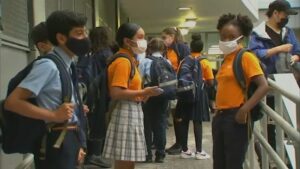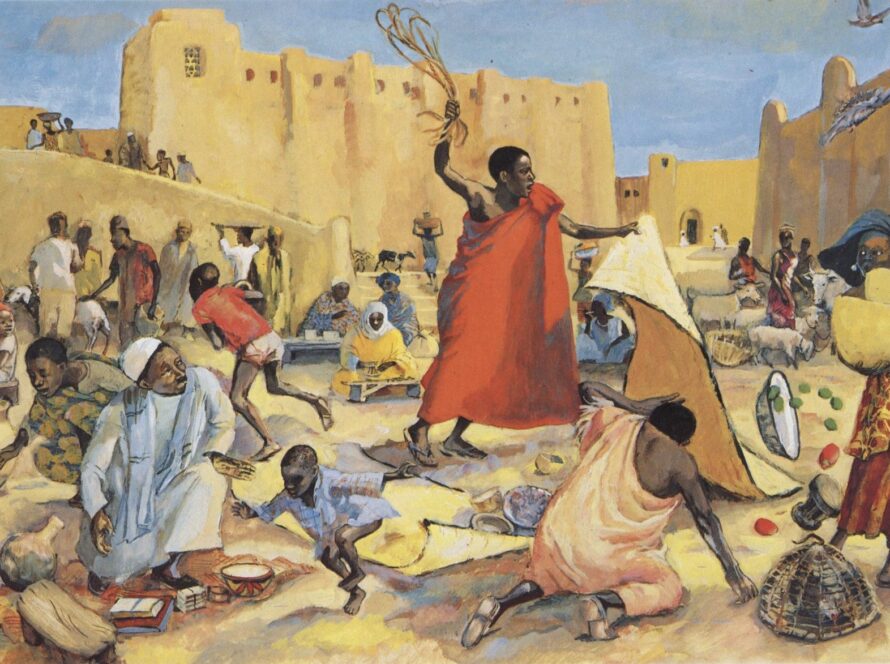Mark 9:38-50 NRSV
38 John said to him, “Teacher, we saw someone casting out demons in your name, and we tried to stop him, because he was not following us.” 39 But Jesus said, “Do not stop him; for no one who does a deed of power in my name will be able soon afterward to speak evil of me. 40 Whoever is not against us is for us. 41 For truly I tell you, whoever gives you a cup of water to drink because you bear the name of Christ will by no means lose the reward. 42 “If any of you put a stumbling block before one of these little ones who believe in me, it would be better for you if a great millstone were hung around your neck, and you were thrown into the sea. 43 If your hand causes you to stumble, cut it off; it is better for you to enter life maimed than to have two hands and to go to hell, to the unquenchable fire. 45 And if your foot causes you to stumble, cut it off; it is better for you to enter life lame than to have two feet and to be thrown into hell. 47 And if your eye causes you to stumble, tear it out; it is better for you to enter the kingdom of God with one eye than to have two eyes and to be thrown into hell, 48 where their worm never dies, and the fire is never quenched. 49 “For everyone will be salted with fire. 50 Salt is good; but if salt has lost its saltiness, how can you season it? Have salt in yourselves, and be at peace with one another.” Background Today’s passage continues from the passage we read last week. This chapter highlights the ongoing challenge of Jesus and Crew building a community and setting norms of how they will do ministry together. Jesus reminds the disciples that no one loses anything by “giving a cup of water to drink.” In your own personal devotional period, read the entire 9th chapter. What kind of characteristics does Jesus display in this passage? Today’s lesson will focus on discerning the need for righteous anger. Read the scripture out loud together. What’s happening during this passage? John is concerned because someone is “Casting out demons in [Jesus] name.” He doesn’t like the idea that someone who has not been credentialed is doing the work in Jesus’ name. Jesus corrects him and says “don’t stop him, whoever does this work in my name will not be able to speak ill of me. Anyone who is not against us is for us. Whoever gives you water to drink because you are connected to me will not lose the reward.” Jesus redefines the boundaries of “who is inside” and “who is outside.” Jesus goes on to argue that anyone who presents themselves as a stumbling block before “these little ones,” it would be better for you to hang a heavy stone around your neck and be thrown into the sea. He goes further to say that if it is your hand that makes you present a stumbling block before the little ones, then “Cut it off. “Same for your feet and eyes. He also is clear to say that otherwise, you will be “thrown into hell, where the worm never dies, and the fire is never quenched.” What is up with this violence? We often speak about Jesus as a non-violent and sweet man who walks around the desert in sandals. We speak of Jesus as though he is a non-threatening presence. But in this vignette, we see the side of Jesus that is bold, protective, and aggressive. He is offering a warning to anyone who would harm his friends. Someone who hangs a millstone around their neck and falls into the sea will most certainly be “sleeping with the fishies.” Jesus basically tells people to be prepared for hell, where the “worm never dies, and the fire is never quenched.” That reads like a curse, doesn’t it? Jesus is responding to violence. He is not starting the violence. It reminds us of the old proverb, “I might not start nothing, but I’m gon’ definitely finish it!” He is responding to the inhumane treatment that he and his loved ones have endured. He’s asking us to get to the root of the problem. If we look to the root of the problem, we will hold the right people accountable for their behaviors. Those who do harm to the little ones are the most vile in Jesus’ opinion. Who are the little ones? The Greek word used in the passage is “mikros,” where we get the prefix “micro” in English. Think microwave, microscope, microphone. In all these English words, these are examples of small things becoming amplified. Microwaves use small waves to energize water molecules in food, which heats the food up. Microscopes and microphones take small sounds and views and make them bigger. Mikros isn’t just about smallness; we can use the word “mikros” to think about how to amplify and witness things in bigger ways. Mikros can refer to size, quantity, rank, power, age. It can refer to systematically marginalized people. It’s used elsewhere to describe the smallness of the mustard seed. Even though mustard seeds are small, they are powerful because they travel well due to their size. These are all metaphorical and figurative ways to understand “mikros” or “the little ones.” Most literally, Jesus can also be talking about children. In Jesus’ imagination, children feature as an especially protected class of people. He often speaks positively of them and includes them in the project of healing. What questions do you still have of this scripture? How will you commit to journeying with this text this week? Connection to Today’s World
The Center for Disease Control has given contradictory information over the course of the pandemic. It has been difficult for everyday people to discern risk and exposure factors because of this contradictory information. The good news is that the CDC has recommended that all people wear masks in schools regardless of vaccination status. But the bad news is that they have also recommended just “three feet” of physical distance to reduce transmission risk.
In majority-Black schools, like the ones many of our young people attend, there is poor ventilation, few outdoor spaces, and few school nurses and guidance counselors. It is important for us to check in with our “little ones,” and not just about how the academic element of school is going. Ask them how they are feeling about returning to class, what feels new and strange, what do they want more of or less of? What are some ways we can welcome them home after an intense day of being around many other people?
Journal: Can you think of people who have been a “Stumbling block”?” Have you ever been a stumbling block to someone else?
Closing: Listen to “If It Had Not Been,” sung by Helen Baylor
Connection to Today’s World
The Center for Disease Control has given contradictory information over the course of the pandemic. It has been difficult for everyday people to discern risk and exposure factors because of this contradictory information. The good news is that the CDC has recommended that all people wear masks in schools regardless of vaccination status. But the bad news is that they have also recommended just “three feet” of physical distance to reduce transmission risk.
In majority-Black schools, like the ones many of our young people attend, there is poor ventilation, few outdoor spaces, and few school nurses and guidance counselors. It is important for us to check in with our “little ones,” and not just about how the academic element of school is going. Ask them how they are feeling about returning to class, what feels new and strange, what do they want more of or less of? What are some ways we can welcome them home after an intense day of being around many other people?
Journal: Can you think of people who have been a “Stumbling block”?” Have you ever been a stumbling block to someone else?
Closing: Listen to “If It Had Not Been,” sung by Helen Baylor If it had not been for the Lord on my side
Where would I be? Where would I be?
If it had not been for the Lord on my side
Where would I be? Where would I be?
He kept my enemies away
He let the sun shine through a cloudy day
Oh, he wrapped me in the cradle of his arms
When he knew I’d been battered and torn
So…
He never left me all alone
He gave me peace and joy I’ve never known
He answered when I knelt down to pray
And in victory, the Lord showed me the way
PRAYER:
Dear God,
You consider us all your children. There is nothing that can separate us from your love and your warm desires for our lives. We are often encouraged to be bullies. We are tricked into believing that this is a “dog-eat-dog” world, and that if we don’t win, someone else will.
Remind us that we are your little ones. We are your children and your beloveds. Help us to see each person we encounter as someone that you love. Help each person we encounter to see us as someone that you love.
In Jesus’ name we pray, Amen.
WORKS CITED
https://www.cdc.gov/coronavirus/2019-ncov/community/schools-childcare/k-12-guidance.html





